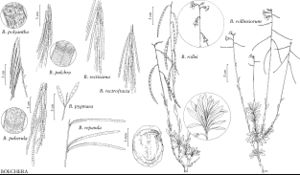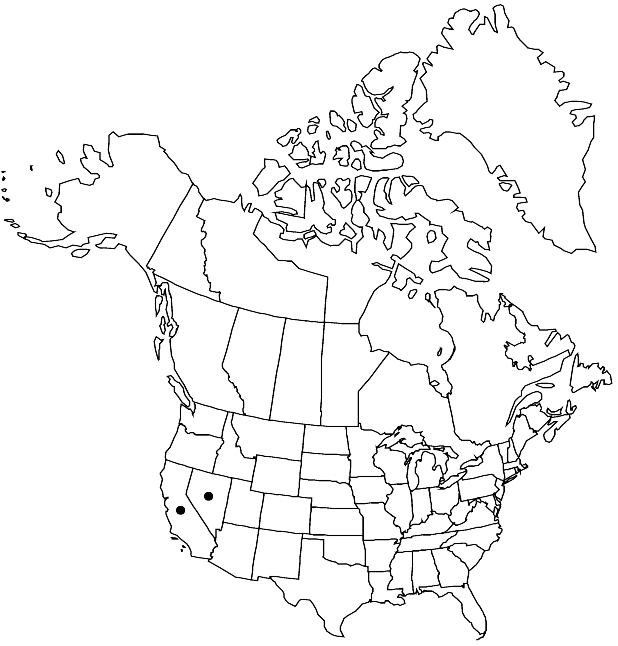Difference between revisions of "Boechera repanda"
Novon 13: 388. 2003.
FNA>Volume Importer |
imported>Volume Importer |
||
| (3 intermediate revisions by 2 users not shown) | |||
| Line 10: | Line 10: | ||
|name=Arabis repanda | |name=Arabis repanda | ||
|authority=S. Watson | |authority=S. Watson | ||
| + | |rank=species | ||
|publication_title=Proc. Amer. Acad. Arts | |publication_title=Proc. Amer. Acad. Arts | ||
|publication_place=11: 122. 1876 | |publication_place=11: 122. 1876 | ||
| Line 16: | Line 17: | ||
|name=Arabis repanda var. greenei | |name=Arabis repanda var. greenei | ||
|authority=Jepson | |authority=Jepson | ||
| + | |rank=variety | ||
}} | }} | ||
|hierarchy=Brassicaceae;Brassicaceae tribe Boechereae;Boechera;Boechera repanda | |hierarchy=Brassicaceae;Brassicaceae tribe Boechereae;Boechera;Boechera repanda | ||
| Line 31: | Line 33: | ||
|elevation=1600-3500 m | |elevation=1600-3500 m | ||
|distribution=Calif.;Nev. | |distribution=Calif.;Nev. | ||
| − | |discussion=<p><i>Boechera repanda</i> is a sexual diploid that is distinguished from all other western North American species by its wide (10–50 mm), repand to coarsely dentate basal leaves. The form recognized as < | + | |discussion=<p><i>Boechera repanda</i> is a sexual diploid that is distinguished from all other western North American species by its wide (10–50 mm), repand to coarsely dentate basal leaves. The form recognized as <i></i>var.<i> greenei</i> appears to be a growth response to ecologically marginal habitats. <i>Boechera repanda</i> occurs sporadically in the Sierra <i>Nevada</i> and Transverse Ranges of California, and barely extends into the Carson Range in western <i>Nevada</i>.</p><!-- |
--><p><i>Arabis</i> inamoena Greene (1911), not Greene (1908) is an illegitimate name, sometimes found in synonymy with <i>Boechera repanda</i>.</p> | --><p><i>Arabis</i> inamoena Greene (1911), not Greene (1908) is an illegitimate name, sometimes found in synonymy with <i>Boechera repanda</i>.</p> | ||
|tables= | |tables= | ||
| Line 41: | Line 43: | ||
-->{{#Taxon: | -->{{#Taxon: | ||
name=Boechera repanda | name=Boechera repanda | ||
| − | |||
|authority=(S. Watson) Al-Shehbaz | |authority=(S. Watson) Al-Shehbaz | ||
|rank=species | |rank=species | ||
| Line 56: | Line 57: | ||
|publication year=2003 | |publication year=2003 | ||
|special status= | |special status= | ||
| − | |source xml=https:// | + | |source xml=https://bitbucket.org/aafc-mbb/fna-data-curation/src/2e0870ddd59836b60bcf96646a41e87ea5a5943a/coarse_grained_fna_xml/V7/V7_580.xml |
|tribe=Brassicaceae tribe Boechereae | |tribe=Brassicaceae tribe Boechereae | ||
|genus=Boechera | |genus=Boechera | ||
Latest revision as of 22:34, 5 November 2020
Perennials; short- to long-lived; sexual; caudex usually not woody. Stems usually 1 per caudex branch, arising from center of rosette near ground surface, (1–)2–9 dm, densely pubescent proximally, trichomes short- to long-stalked, 2–6-rayed, 0.2–0.5 mm, rarely mixed with simple ones, to 1.5 mm, glabrous or sparsely pubescent distally. Basal leaves: blade broadly oblanceolate to obovate, 7–25(–50) mm wide, margins usually repand to coarsely dentate, rarely entire, not ciliate, surfaces moderately to densely pubescent, trichomes short- to long-stalked, 3–6-rayed, 0.2–0.5 mm. Cauline leaves: (3–)8–30, not concealing stem; blade auricles absent, surfaces of distalmost leaves sparsely pubescent. Racemes 7–25-flowered, sometimes branched. Fruiting pedicels erect to divaricate-ascending, straight, 3–10 mm, glabrous or pubescent, trichomes spreading, usually 2–5-rayed, rarely simple. Flowers erect to ascending at anthesis; sepals glabrous or sparsely pubescent; petals white, 3.5–6 × 0.8–1 mm, glabrous; pollen ellipsoid. Fruits divaricate-ascending, not appressed to rachis, not secund, usually curved, rarely straight, edges parallel, (3.5–)5–13.5 cm × 2.5–4 mm; valves glabrous or pubescent throughout; ovules 34–50 per ovary; style 0.5–1.5 mm. Seeds uniseriate, 2.5–5(–6) × 2–3(–3.5) mm; wing continuous, 0.7–1.8 mm wide. 2n = 14.
Phenology: Flowering Jun–Jul.
Habitat: Rock outcrops, talus, and gravelly soil in meadows and open pine forests
Elevation: 1600-3500 m
Discussion
Boechera repanda is a sexual diploid that is distinguished from all other western North American species by its wide (10–50 mm), repand to coarsely dentate basal leaves. The form recognized as var. greenei appears to be a growth response to ecologically marginal habitats. Boechera repanda occurs sporadically in the Sierra Nevada and Transverse Ranges of California, and barely extends into the Carson Range in western Nevada.
Arabis inamoena Greene (1911), not Greene (1908) is an illegitimate name, sometimes found in synonymy with Boechera repanda.
Selected References
None.

